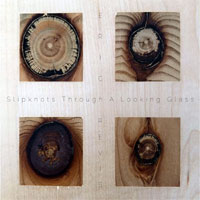Eric Revis • Slipknots Through a Looking Glass
 t surprised some jazz watchers when
Eric Revis, the longtime bassist in Branford Marsalis’s tradition-oriented quartet,
got busy with decidedly more free-jazzy side projects, mixing with distinguished
colleagues from all over. Slipknots Through a Looking Glass has its wild and
disjunctive sides, but placed in service to a compositional sensibility. To steal a phrase
from saxophonist-thinker Steve Lacy, Revis puts fences around the free -- one element
among others. "The polyfree," Lacy called such music. t surprised some jazz watchers when
Eric Revis, the longtime bassist in Branford Marsalis’s tradition-oriented quartet,
got busy with decidedly more free-jazzy side projects, mixing with distinguished
colleagues from all over. Slipknots Through a Looking Glass has its wild and
disjunctive sides, but placed in service to a compositional sensibility. To steal a phrase
from saxophonist-thinker Steve Lacy, Revis puts fences around the free -- one element
among others. "The polyfree," Lacy called such music.
The players on Slipknots include two recent Revis allies, pianist Kris Davis and the highly musical drummer-of-the-moment Chad Taylor, plus saxophonists Darius Jones (alto) and Bill McHenry (tenor). Those two blend very well, lemon and butter, as on “When I Become Nothing,” a lava-flow ballad in the manner of Paul Motian’s out-of-tempo laments, and the medium-gait “ProByte” where contrasting saxes twine, pulling together. When the horns get most abrasive and blustery, notably on “Shutter,” kicked along by a fast, manically persistent snare-drum rock beat, their solos sound like “free jazz” with quotes around it: a very specific color/texture/effect. But even “Shutter” has a shapely long-notey melody the horns grind out a couple of times, under which -- mixed low so it may take you a while to notice -- Kris Davis plays a scrambling piano improvisation, riding the rapids, or racing alongside. That’s typical of her playing here -- inventive, judicious, rarely calling attention to itself. Resourceful as she is, Davis often underplays: her piano can be a full orchestra, or the percussion section’s triangle, waiting to chime in with a solitary gesture. She is one of myriad modernists adept at playing under the grand piano’s hood: of using a hand or small object to stop a string as she keys it with the other hand, coloring the sound, making piano more overtly metal-wood percussive. Her brand of under-hood piano may depend on stubbornly sticking to one simple idea, as a cog in a larger ratcheting machine. On the fetching A-strain of “Baby Renfro” her part grunts along on a few repeated beats: piano as cowbell. She stops the strings at harmonic nodes, so every struck note rings like a gong: a tiny gesture in rhythmic counterpoint carries musical weight. (On the breakaways, Davis’s two-handed playing on the keys gets minor-seconds Monkish -- she’s not always a drum choir.) That main theme’s kicked by Revis’s 16-beat bass ostinato, with a couple of ringing harmonics in the middle of the line, and by guest drummer Justin Faulkner with a hop-and-skip line of his own: three sprockets meshing in Revis’s clock. “House of Leaves” is a running dialogue for bass and Taylor’s drums, broken up by pockets of pithy written material -- Revis calls them “islands” -- for horns and piano, which, popping in and out, slowly thread their way along the archipelago. Halfway through a rhythm trio coalesces, Davis slowly bonging out a single stopped-node note with a percussive edge, drawing in bass and drums, and providing a backdrop to another plaintive Revis saxophone line. There’s another such line on “Earl and the Three-Fifths Compromise,” anchored to another deep-groove bass ostinato -- with another guest shot by Branford’s drummer Justin Faulkner. (A couple of compositions Revis wrote at the same time are on Marsalis’s 2019 The Secret Between the Shadow and the Soul; the bassist’s two sides are not always so far apart.) Kris Davis’s piano drum choir makes a conceptual link with Chad Taylor’s “thumb piano” mbira (an instrument in which he has more than a casual interest). That sonic kinship is exploited by “SpÆ” for bass, prepared piano and mbira, actually three improvisations in contrasting grooves artfully cross-faded together -- including a section where the pianist plays against herself. That 3x3 composition is mirrored by three short Revis pieces for multi-tracked basses. Overdubbed plucked bass improvisations tend to be lumbering affairs, and these run true to form. What saves them is a lone bowed bass in the background, low in the mix, squealing like seagulls in a distant sky. Jazz recording tends to take a documentary approach:
catching, or simulating, the sound of a band in performance. As those multiplied basses,
“SpÆ”’s cross-fades and “Baby Renfro”’s buried piano
demonstrate, Revis and producer Ron St. Germain tailor their mixes track by track,
presenting this music as an album: a freestanding sonic artifact, one to keep you coming
back like it’s a pop record. |
